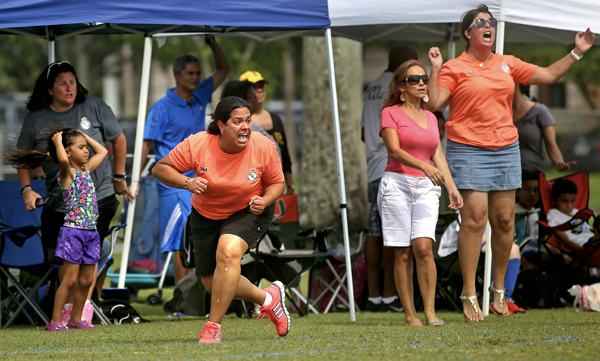 Some of the most successful high school coaches in Central New York are leaving in frustration or losing their jobs, in a new-generation battle with helicopter parents and the chase for college scholarships.
Some of the most successful high school coaches in Central New York are leaving in frustration or losing their jobs, in a new-generation battle with helicopter parents and the chase for college scholarships.Many more say they are considering quitting, according to a survey of 227 coaches by Syracuse.com.
Just this past school year, baseball coach Bob Weismore left Westhill and girls lacrosse coach Doug Rowe left Baldwinsville apparently over behind-the-scenes entanglements with parents. Weismore won 328 games and two state titles in 16 season at Westhill. Rowe won one state title and 362 games over 26 seasons in Baldwinsville.
Jamesville-DeWitt boys basketball coach Bob McKenney was dismissed after the 2015 season over what he claimed was a parent “who wanted me fired.” McKenney coached at J-D for 19 seasons and led the Red Rams to five state championships.
South Jefferson girls basketball coach Pat Bassett, who led the Spartans to two state titles and five Final Fours, was forced out last fall after parent complaints. More than 300 supporters signed a petition in support of Bassett to no avail.
Notre Dame High School in Utica fired girls basketball coach Mike Plonisch a year after his team won the state championship in 2014. The same school also forced football coach Byron Abraham to resign over discipline issues with players missing practice. Both dismissals carried the scent of parent involvement.
In the aftermath of these departures, Syracuse.com surveyed head coaches throughout Section III about the environment and impact of parents on high school sports.
Of the 227 coaches who responded, 82 percent said dealing with parents has gotten worse.
Sixty percent of coaches said they’ve had to speak with parents about their conduct.
And 58 percent of the coaches said they’ve considered quitting because of parents.
Tom Blackford left his position after the 2015-16 season as head basketball coach at Fayetteville-Manlius High School. He said dealing with parents was a factor in his decision to leave after serving the Hornets for 14 seasons and return to tiny Hamilton High School, where he began his coaching career.
“I’ve coached in four decades,” Blackford said. “I’ve seen a lot. The landscape has certainly changed for coaches.”
Coaches have playbooks full of war stories involving parents and how they’ve impacted their professions, their personal lives and the value of high school sports. One Section III coach called the current environment “insane.” Another called it “crazy.”
West Genesee High School boys lacrosse coach Mike Messere let out a long sigh when asked if dealing with parents has gotten worse. He said he’s lucky in that he has good parents, for the most part. But he also understands and believes a toxic slurry of elements exists including the pressure to win, political correctness, fear of lawsuits and fear of administrators no longer backing their coaches. That, Messere says, is creating something more insidious.
“Something has changed in my life,” said Messere, the winningest boys lacrosse coach in the nation with more than 800 wins in 40 seasons with the Wildcats.
“It’s become stressful. That’s (what’s) different. You’re always worried you’re going to do something wrong.
“I see the (exit) doorway opening for me. Believe me, it’s opening up.”
Robert Zayas is the executive director of the New York State Public High School Athletic Association. He said he’s reminded of something he once heard former ESPN announcer Stuart Scott say during a broadcast of the Little League World Series.
“He said parents are the best thing about youth sports, and they’re the worst thing about youth sports; because youth sports can’t exist without parents,” said Zayas.
Coaches do point out that many parents behave responsibly and support their children and teams in the right way. It’s the newest strain of overbearing parents that cause the problems, the parents who
believe they have their children’s best interests at heart but act destructively and create hostile battles with coaches, administrators and other parents.
Conversations and complaints in the stands become vitriol spewed at coaches across social media platforms. Open conflicts play out before board of education meetings. A few battles have devolved into violence.
Earlier this year, the father of a lacrosse player at Mahopac High School was convicted of criminal mischief and harassment after attacking a coach who had cut his daughter from the squad.
Last winter, the parent of Mississippi high school girls basketball player was charged with felony assault after a coach was knocked out cold for trying to enforce a rule that players ride the bus home after a game.
“Social media and parents thinking that their kids are going to get scholarships have definitely had an impact on coaches,” said Lyle Dixon, president of the New York State High School Football Coaches Association.
“We have had football coaches who have won state titles resign due to parental pressures, and I had a very good girls soccer coach quit and will probably never coach again because of attacks by parents.
“Parents are pushing their kids so much that by the time they graduate from high school they don’t want to participate anymore,” Dixon added.
There is growing privatization usurping high school sports. The best soccer and hockey players are choosing club teams over playing for their high schools because of scholarship marketing. AAU basketball and summer club lacrosse have become recruiting grounds for college coaches. In Buffalo and Rochester, private volleyball clubs are having a growing impact on the high school teams in those areas.
If Mom and Dad are forking out hundreds, maybe thousands of dollars for off-season travel ball, they’re likely expecting a return on their investment when their high school teams compete.
In the Syracuse.com survey, 76 percent of coaches said AAU and summer travel teams have made their relationship with parents worse.
Messere believes the club scene is smoke and mirrors. He said parents are paying for college recommendations that colleges may discount. He said by the time those players return to their high school teams, many have bad habits and a false sense of their abilities. When they don’t play or are shuffled down a depth chart, there can be trouble.
The reality is that there are precious few scholarship dollars out there, and what’s there is frequently divided and subdivided and dispensed incrementally for elite athletes. The 2016 men’s lacrosse roster at Syracuse University listed 51 players. The NCAA limits each Division I school to a total of 12.6 scholarships. If some rare stars receive a full scholarship, what does that leave for the rest of the squad?
According to the web site scholarshipstats.com and using data from 2013-14, only about 2 percent of high school athletes (about 1 in 50) went on to play a sport at the Division I level.
“I have been coaching 30 years,” said Holland Patent baseball coach Scott Parsons. “It is always the same. The parents think their kids are D-I superstars.”
“I’ve been accused of costing numerous kids D-1 college scholarships,” said Proctor football and baseball coach Steve Strife. “I find it laughable because when is the last time a D-1 scholarship kid didn’t play on their HS team? I would guess never!”
In the incident involving the parent and girls lacrosse coach at Mahopac High School, the attacking parent said in court documents that he told the coach, “he could have cost my daughter a scholarship.”
That sentiment, along with a feeling of entitlement because of extensive travel ball commitment, is poisoning high school sports across every platform, according to Section III coaches.
“Parents today are tricked into thinking their child is going to be a Division I player as long as they participate on a particular Club Team or AAU Team,” said Tim Clive, the girls soccer and basketball coach at Sauquoit Valley. “It leaves the high school coach struggling when we don’t recruit players. I have had to deal with more parents in the past few years who have been paying big dollars for their daughter to play at the Club or AAU level. Most problems arise out of playing time and can get quite annoying. Even after we have parent/coaches meetings prior to each season and the ground rules are discussed in detail.”
The No. 1 problem with parents, according to coaches in the Syracuse.com survey, is about playing time for their children. In the survey, 38 percent of 197 respondents said playing time topped the complaining charts.
It is not, however, exclusive to the dynamics.
In the coaching survey, 32 percent of respondents mentioned parenting conflict over coaching strategy.
And 30 percent mentioned problems with parent behavior and unsportsmanlike conduct at games or events.
Coaches said they’ve been harassed by parents on site and over the phone. Messere said he once had an angry parent show up at his home. One coach said he was physically threatened before a game by a parent who wanted to “kick my ass” over their son’s playing time. Two indicated they filed harassment charges against parents. And two coaches recounted stories that remained so personally painful – even though they occurred years ago – they asked details not be used.
Coaches say they feel more vulnerable, sometimes, because they don’t always believe the school administration has their backs. Rowe said it was a critical factor in his decision to leave Baldwinsville.
“The bottom line is, the board of education and the administration need to do their job and back people and support people and find out the truth,” Rowe said. “That wasn’t going to happen. Rather than fight the system, I said I’m tired of doing it.”
Messere and Blackford both say this is a real crisis that coaches are facing.
Blackford said parents no longer necessarily go to their coaches with grievances. They sometimes bypass their athletic directors and go straight to the principal, superintendent or board of education. One coach said it’s simply become easier for schools to make changes with their coaches than deal with the complaint.
“Coaches need to feel they’re supported,” Blackford said. “If you don’t feel like you’re supported and you have nowhere to turn, a lot of coaches step down.”
“They’re afraid of parents,” Messere said. “They’re afraid of a lawsuit or the thought one was coming. When they freeze up, you’re done.”
Zayas said he’s unsure if the state is losing coaches at the high school level. He admits there is a shortage of coaches at the modified level along with a statewide shortage of game officials.
The sad part, said Zayas, is the coaches get into the business because they want to help kids. Now, the culture has changed and coaches, he said, are now asked to wear many more hats than a decade ago.
“I know it’s a problem,” said Sue Ludwig, girls basketball coach at Westhill High School. “There are a lot of dynamics. I’d say for young coaches out there today, it’s just super difficult. I can’t imagine myself coming up as a young coach. There’s a ton of pressure to win.”
Skaneateles chose not to retain girls basketball coach Jill Blasi after the season. Blasi, 35, was 69-33 in five seasons with the Lakers. She said she was given no reason for her dismissal. School officials declined to comment on why.
“I’m mad. I’m crushed. It’s disheartening,” said Blasi at the time.
There also is concern at the national level.
Gary Mussleman is the executive director for the Kansas State High School Athletic Association and the new president of the National Federation of State High School Associations. He hears the alarms.
“I think one can safely say that schools across the nation are finding it more challenging each year to find certified educators who are willing to coach at the interscholastic level and thus having to turn to non-faculty coaches to staff their programs,” Mussleman said. “I believe that increasing expectations of parents and students may play a part in the reluctance of some to take on coaching duties, but my observation is that scholastic coaches have always put the greatest pressure on themselves.
Scholastic coaching is very demanding on one’s time and can put strains on families of coaches as well. A work life balance can be difficult to maintain for some. When one considers the time and commitment it takes to teach in today’s schools, the additional workload and time commitment of coaching is simply too much, hence the declining number of teachers willing to fill those coaching positions. “
The playing ground is shifting. Coaches are now asking if it’s worth it? Some are saying, no.
“Coaches used to coach for a career,” said Dixon, “and now you are lucky to keep a coach for four or five years.”
Ludwig, who is the all-time winningest girls basketball coach in Section III and is closing in on 500 wins, said she and her staff work hard, starting at an early age, to develop communication, expectations and relationships in the program for players and parents. Some tune in. Some check out.
Ludwig said she sees athletes who want more but give less. And she sees parents, at the first hint of trouble, trying to intervene or attempt to problem solve instead of letting the players learn from mistakes or work through tough times.
There may be a book from all of this in Ludwig’s future. She said she’s already got the title, “You Can’t Win for Winning.”
“Loyalty today is far and few between,” Ludwig said for the high school coaching ranks. “I always say the door will never hit me on the butt. If things go down and I don’t see loyalty and backing, you won’t have to force me out. I think honestly, it’s not worth it to me. This is a part of my life – a big part of my life – but it’s not the end of the world.”
Credits:
Donnie Webb





Recent Comments